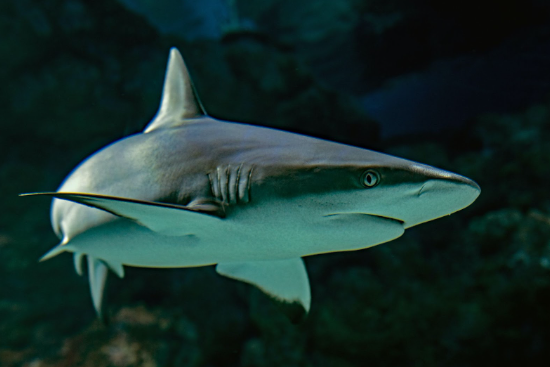To bite or not to bite

March 2, 2023
Sharks are an incredibly important part of the environment but are often written off as scary, murderous beasts.
In nature, every animal plays an important role in their ecosystem and, in the greater scheme of things, the food web. Herbivores keep plants from overgrowing; predators keep prey from overpopulating. Among the predators, one resides in the ocean that is often ruled off thanks to media portrayals and those sharks.
“I think sharks when it comes to being scary are overrated; they don’t even kill three people in a year,” sophomore Ezra Bozo said.
In a poll done by scientists last year to determine how many Americans were scared of sharks, 51% of Americans reported a fear of the fish, and 38% are scared to swim because of them. Interestingly, psychologist Gabriella Hancock said people are not naturally born afraid of sharks; in fact, studies with babies only five months old showed they were not afraid of sharks. The media’s portrayals of sharks, more infamously with the 1978 movie “Jaws,” caused an entire generation of people to develop galeophobia. Scientists have called this “the Jaws effect.”
“You know that the creator of ‘Jaws’ even said that he regretted[causing the fear], and plus sharks don’t even mean to attack people,” sophomore Mackenzie Brunton said.
The fear of sharks also causes people to overlook how important they are to the environment and what they contribute.
“I had no idea how important[sharks] were. I knew they were dangerous if provoked but not as scary as people made them out on the internet and media but with the little bit I know about them I’d definitely like to know more about them,” junior Efrain Esquivel said.
Sharks have a few key roles in nature to keep things balanced, especially in regards to population control. Most species of sharks often feed on predatory fish to keep them from overpopulating their ecosystem. If sharks were to disappear, those types of fish would thin out the population of herbivore fishes. Without these fish, algae would begin to grow out of control and take over. Even with their presence alone, sharks will scare off other creatures to keep them from overfeeding in an area.
“The overabundance of algae would be very bad for the ecosystem, which is why I love sharks,” Bozo said.
When it comes to survival of the fittest, sharks play an important role. Fish in the wild that are weak are preyed upon by sharks so that the healthy will live long enough to pass off their superior genes.
“Sharks do a lot for the environment, and I think that the way they get depicted in pop culture is really unfair to them,” Esquivel said.
Thanks to growing awareness of the true nature of sharks, a majority of shark species are large and sustainable enough for endangerment to not be a problem at the moment. However for some species, their population count has been decreasing at an alarming rate thanks to overfishing and shark finning. In 2009, The Shark Conservation Act was passed and required all sharks in the US to be brought to shores with their fins intact. Since then however, not much has been internationally to preserve sharks . The possibility of sharks facing endangerment is slowly becoming a reality and their preservation is important if balance in nature is to be upheld.
“Sharks are amazing creatures, they’re really good with pest and population control plus I think they are beautiful creatures,” said Brunton. “Sharks barely kill three people a year while people kill millions a year and they should really stop.”
